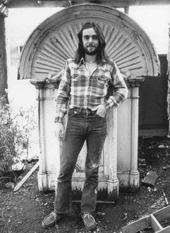Terry Reid (born November 13, 1949, Huntingdon, England) is a rock singer and guitarist noted for his soulful voice in the same vein as contemporaries Paul Rodgers and Rod Stewart.
After leaving school at the age of 15, Reid joined Peter Jay's Jaywalkers after being spotted by the band's drummer, Peter Jay. At the time Reid was playing for a local band, The Redbeats. His public profile was enhanced in 1966 when The Jaywalkers were named as a support act for The Rolling Stones for their Albert Hall concert. Graham Nash of The Hollies became friends with Reid at that concert and suggested The Jaywalkers sign up with Columbia Records to record with producer John Burgess. Their first single, the Soul-inspired "The Hand Don't Fit the Glove," was a minor hit in 1967, but by then The Jaywalkers had already decided to disband.
Reid came to the attention of hits producer Mickie Most, who became his manager. His first single with Most, "Better By Far," became a radio favourite, but the album, Bang Bang, You're Terry Reid, was not a commercial success. A 1968 tour of the United States with Cream did much to gain Reid a loyal following. His final performance of the tour at the Miami Pop Festival garnered positive reviews from the music press. In 1969, Reid supported various British tours, notably Jethro Tull and Fleetwood Mac.
Yardbirds guitarist Jimmy Page became interested in Reids work, and when The Yardbirds disbanded, Page wanted Reid to fill the vocalist spot for his proposed new group, which was to become Led Zeppelin. Reid suggested to Page that he consider a young Birmingham singer, Robert Plant, instead, having previously seen Plant's Band of Joy as a support act at one of his concerts. Reid later turned down an offer to join Deep Purple when they decided to replace singer Rod Evans; Ian Gillan was given the position instead.
Terry Reid's second album, Terry Reid (1969, is regarded by critics as his best work. Reid toured the United States again and appeared at the infamous Rolling Stones concert at Altamont. Reid, however, became involved in a dispute with producer Mickie Most, who wanted Reid to become a balladeer, and to strictly follow his own formula; the same problem the Yardbirds had experienced with Most years earlier. Reid then left England and settled in California to sit out the remainder of his contract with Most, making only sporadic live performances during that period. In 1970, he returned briefly to England to perform at the Isle of Wight Festival. In 1973, Reid returned with a new contract with Atlantic Records and a new album entitled River. Produced by Yes's Eddie Offord, the album received favourable reviews, but was a commercial flop.
Over the next decade, Reid switched to different labels in search of a winning formula; Seed of Memory released by ABC Records in 1976 (produced by Graham Nash), and Rogue Waves released by Capitol Records in 1979. He retired his solo career in 1981 to concentrate on session work, appearing on albums by Don Henley, Jackson Browne and Bonnie Raitt. In 1991, Reid returned with former Yes producer Trevor Horn, on the album The Driver. The album featured a cover version of the Spencer Davis Group classic, "Gimme Some Lovin'", which had earlier appeared on the Days of Thunder soundtrack. "The Whole of the Moon", written by Mike Scott, was released as a single and received considerable airplay. Reid has since been playing occasional live gigs with a band which has included ex-Rolling Stones guitarist Mick Taylor and Brian Auger.
In late 2005, Reid returned to the UK for his first tour in years., it is understood that the 'magic shone through'. One venue billed him as 'The Man With A Hell Of A Story To Tell'.
